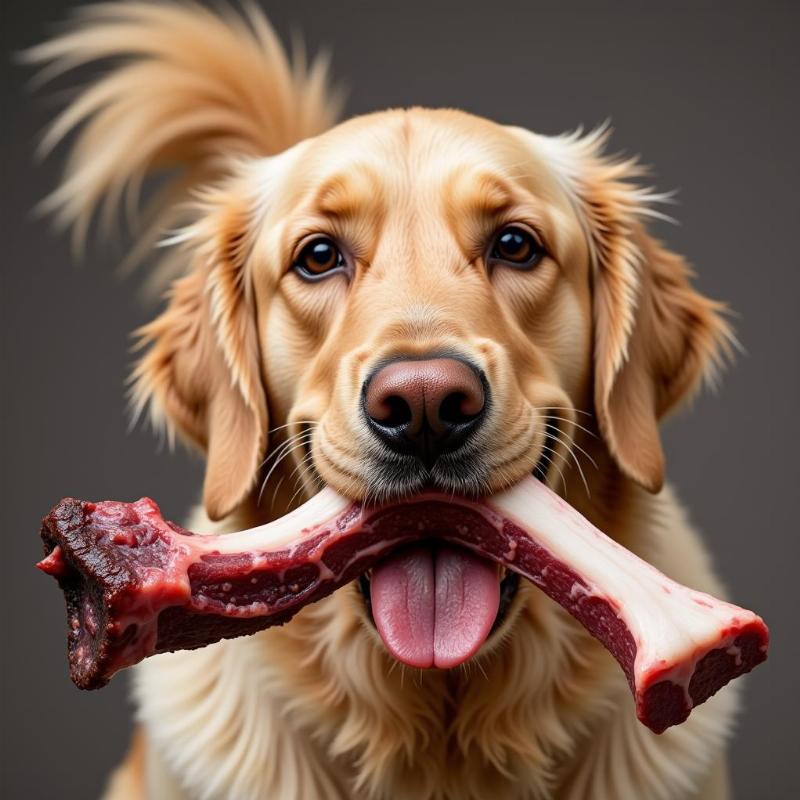Beef rib bones are a tempting treat for many dog owners to give their furry friends. The image of a happy dog gnawing on a bone is a classic one. However, are beef rib bones truly safe for dogs, or do they pose hidden dangers? Understanding the potential risks and benefits associated with giving your dog beef rib bones is crucial for responsible pet ownership.
The Allure of Beef Rib Bones for Dogs
Dogs have a natural instinct to chew, and a beef rib bone seems like a perfect outlet for this behavior. It provides mental stimulation, helps clean teeth, and can be a satisfying treat. However, the very qualities that make beef rib bones appealing can also make them hazardous.  A dog gnawing on a beef rib bone
A dog gnawing on a beef rib bone
The Dangers of Cooked Beef Rib Bones
Cooked beef rib bones are significantly more dangerous for dogs than raw bones. The cooking process makes the bones brittle and prone to splintering. These sharp fragments can cause serious damage to your dog’s digestive tract, including choking hazards, perforations of the esophagus or stomach, and blockages in the intestines. Veterinary intervention is often required in these situations, and the outcome can be costly and even life-threatening. Avoid cooked beef rib bones entirely.
Raw Beef Rib Bones: A Safer Alternative?
While raw beef rib bones are generally considered safer than cooked ones, they still pose some risks. Bacterial contamination is a concern, particularly with Salmonella and E. coli. While a dog’s digestive system is designed to handle some bacteria, there’s still a risk of illness, particularly in puppies, senior dogs, or dogs with compromised immune systems. Additionally, even raw bones can splinter, albeit less frequently than cooked bones. Always supervise your dog when they are chewing on any type of bone.
Choosing Safe Chews for Your Dog
Instead of beef rib bones, consider safer alternatives like long lasting dog chew bone. There are numerous chew toys available that are designed to satisfy a dog’s chewing instincts without the risks associated with bones. Look for durable, non-toxic toys made from materials like nylon or rubber. healthy dog chews for small dogs are readily available too. These come in a variety of shapes, sizes, and textures to suit different breeds and chewing styles.
Can My Dog Eat Beef Stew?
It’s understandable to be curious about whether the beef in your stew is safe for your canine companion. For a comprehensive guide on this topic, visit our dedicated article can dogs eat beef stew.
What About Other Treats?
Offering your dog a variety of treats keeps them engaged and happy. Looking for a healthy and unique option? Check out our article on quail eggs good for dogs for insightful information.
Sourcing Safe and Healthy Chews
Finding reputable sources for dog treats is essential for ensuring your pet’s safety and well-being. For those interested in unique and healthy chews, our article on where to buy chicken feet for dogs provides valuable information and resources.
Conclusion
While the image of a dog with a beef rib bone is iconic, the potential risks, particularly with cooked bones, outweigh the benefits. Prioritize your dog’s safety by opting for safer alternatives like durable chew toys or rawhide chews. Always supervise your dog during chewing sessions, and consult with your veterinarian if you have any concerns about your dog’s diet or chewing habits. Remember, a happy and healthy dog is a priority.
FAQ
- Are beef rib bones ever safe for dogs? Raw beef rib bones are generally safer than cooked ones, but they still carry risks.
- What are the risks of giving my dog a cooked beef rib bone? Cooked beef rib bones can splinter, causing choking hazards, internal injuries, and digestive blockages.
- What are some safe alternatives to beef rib bones? Durable chew toys made from nylon or rubber are safe alternatives.
- Should I supervise my dog when it’s chewing on a bone? Always supervise your dog when they are chewing on anything, especially bones.
- What should I do if my dog swallows a bone fragment? Contact your veterinarian immediately.
- Can I give my dog small beef rib bones? The size of the bone doesn’t eliminate the risk of splintering. Avoid giving beef rib bones altogether.
- Are there any specific breeds more susceptible to bone-related injuries? Smaller breeds with delicate digestive systems might be at higher risk.
Beautdogs.us is your trusted resource for all things dog-related. We offer expert advice on dog breeds, care, and products, catering to both new and experienced dog owners. From breed-specific information to product reviews and comprehensive guides, Beautdogs.us is dedicated to providing dog lovers with the knowledge they need to ensure their furry companions lead happy and healthy lives. Contact us for personalized advice at [email protected] or call us at +1 501-555-7529.